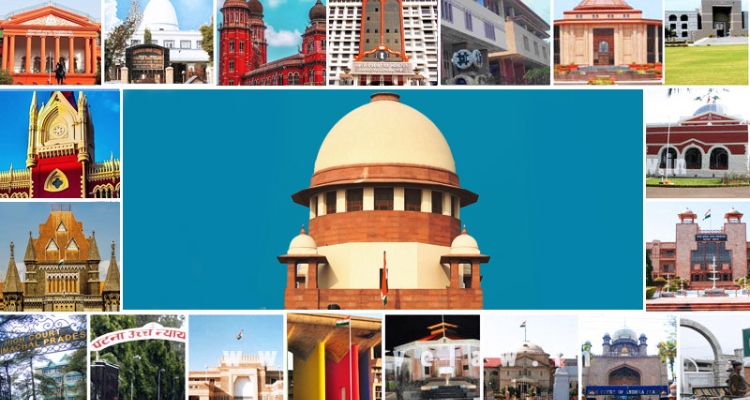
A concise summary of the different court’s key/important orders and judgments from last week.
Weekly Round-Up-
Amit Shah Emphasizes ‘Nyay’ Over ‘Dand’: Unveiling India’s 3 New Criminal Laws
NEET-SS 2024: SC Issues Notice on Plea against NMC’s Decision of Not Holding Exam
The Supreme Court sought responses from the Centre and other bodies on a plea challenging the National Medical Commission’s decision not to hold the NEET-SS exam in 2024. The bench scheduled a further hearing for July 26, 2024.
Hathras Stampede: UP Police Conducts Search At Bhole Baba’s Ashram
The Uttar Pradesh government has set up a judicial commission led by retired judge Brijesh Kumar Srivastav to probe the Hathras tragedy and stampede that killed 121 people. The commission will investigate potential conspiracies and organizers’ compliance. FIRs have been filed against event organizers, with further scrutiny from the Supreme Court and High Court.
Delhi High Court Seeks Bar Associations’ Response on 33% Reservation For Women Advocates
A plea was submitted to the Delhi High Court requesting a 33% reservation for women advocates in bar elections. In response, the court has sought input from all major bar associations in Delhi, including the Bar Council of Delhi (BCD), the Delhi High Court Bar Association (DHCBA), and each District Bar Association in the capital.
No Bail for NDPS Act Accused Based Solely on HIV Status
The Supreme Court has rejected bail for an accused under the NDPS Act solely on the basis of their HIV status, emphasizing the requirements of Section 37 of the Act. This section stipulates that bail should not be granted unless the court is convinced the accused is not likely to commit further crimes or is not involved in the alleged offense.
NI Act: Court Encourages Settlement in Check Bounce Cases
The Supreme Court reiterated that the primary goal of the Negotiable Instruments Act, 1881 (NI Act) is to uphold the reliability of checks. It suggested that courts should encourage settlements in check bounce cases rather than focusing on punitive measures. Justices Sudhanshu Dhulia and Ahsenuddin Amanullah advocated for settlements in these cases.
Constitutional Courts Can Grant Bail Despite UAPA Restrictions
In a significant ruling, the Supreme Court stated that constitutional courts can grant bail even when statutory restrictions apply under the Unlawful Activities (Prevention) Act, 1967 (UAPA). This is possible if there is a violation of the right to a speedy trial under Article 21 of the Constitution. Justices JB Pardiwala and Ujjwal Bhuyan granted bail to Sheikh Javed Iqbal after a prolonged detention without trial progress.
Supreme Court Directs NTA to Publish NEET-UG 2024 Results by Center
On July 18, the Supreme Court ordered the National Testing Agency to publish NEET-UG 2024 results city-wise and center-wise on its website by Saturday noon. This order was given in response to petitions seeking cancellation of the NEET-UG 2024 exam due to alleged paper leaks and misconduct.
Market Fees Under Punjab Agricultural Produce Market Act Different from Rural Development Fees
The Supreme Court has clarified that market fees collected under the Punjab Agricultural Produce Market Act, 1961, are distinct from rural development fees collected under the Punjab Rural Development Act. The court observed that while there might be overlaps, the benefits do not equate.
No Automatic Wage Equality for Different Positions
The Supreme Court ruled that wage equality can’t be claimed as an immutable right merely because different positions have the same pay scale. Equal pay must be established through deliberate action by the competent authority, and discrepancies without clear equations do not violate Article 16 of the Constitution.
Minimum Qualification Candidates Not to be Excluded for Lack of Experience
On July 16, the Supreme Court granted relief to a candidate who was excluded from the merit list by the Bihar Staff Selection Commission due to zero work experience, despite meeting the minimum qualification criteria.
Agreement Must Be Written and Signed
The Supreme Court ruled that agreements must be in writing and signed by parties to be valid. Statements alone, presented before the court, do not constitute a valid agreement.
Acceptance of Prosecution Documents Not Violation of Article 20(3)
The Supreme Court clarified that requiring an accused to accept or reject the authenticity of prosecution documents under Section 294 of the CrPC doesn’t violate their right against self-incrimination under Article 20(3) of the Constitution.
Revenue Records Do Not Affect Rights Under a Deed
The Supreme Court ruled that delays or negligence by the state government in updating revenue records do not nullify rights conferred under a deed. Once property is transferred through a valid gift deed, it remains under state ownership despite record discrepancies.
Prosecution of Serious Crimes Cannot Be Withdrawn Due to Public Image
The Supreme Court held that the prosecution of serious crimes, such as double murder, can’t be withdrawn solely based on the accused’s positive public image as an elected representative. The court rejected the withdrawal of prosecution in a 1994 double murder case involving a former BSP legislator.
No Need to Cancel Later Sale Deeds in Specific Performance Suits
The Supreme Court ruled that a plaintiff does not need to seek the cancellation of later sale deeds when filing for specific performance of a contract, provided the property was purchased in bad faith and with knowledge of the initial agreement.
Separate Lawsuits for Possession and Rent Arrears Acceptable
The Supreme Court noted that a lawsuit for possession and a separate lawsuit for rent arrears can be filed independently. Such separation is not prohibited under Order 2 Rule 2 of the Civil Procedure Code.
Bribery Demand Must Be Confirmed Before Trap Action
The Supreme Court emphasized that bribery charges against a public servant cannot be sustained unless the demand for a bribe is confirmed. Evidence such as recorded conversations between the bribe giver and the suspect can be used to prove the bribe demand.




